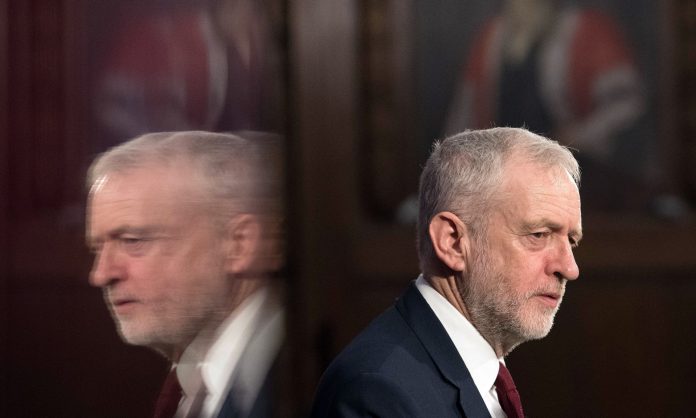Jeremy Corbyn could use a key Brexit speech on Monday to pave the way for Labour to inflict a Commons defeat on the government, by backing a rebel Tory amendment seeking to keep Britain in “a customs union”.
With Theresa May expected to unveil her vision for departure from the EU next week, following eight hours of talks with key ministers at the prime minister’s Chequers country retreat, she now faces the prospect of Labour sabotaging the carefully choreographed process.
In what will be a closely watched speech, Corbyn is expected to signal that Labour is prepared to back the UK staying in a customs union with the EU.
The party has said for some months that customs union membership is a “viable” outcome but a series of interventions from shadow cabinet members in recent days, including Emily Thornberry and John McDonnell on Thursday, have suggested Labour is edging towards making it the preferred result.
Drafts of the speech have been circulating, with some shadow cabinet members insisting it would mark a significant departure. But other senior Labour figures suggested Corbyn would merely “flesh out and deepen” the party’s existing stance; and some shadow ministers are concerned about alienating pro-leave Labour voters.
Tory rebel Anna Soubry responded to the apparent shift in Labour’s position by tabling a fresh version of an amendment to the government’s trade bill, calling on the government to remain in “a customs union”. She said a large number of Tory MPs had already contacted her to offer their support.
The bill is not expected to return to parliament until after Easter, and Labour has not yet made a firm decision on which amendments it could back.
But if Corbyn whipped his MPs to support it, Conservative MPs could inflict a highly damaging defeat on May that would amount to a direct challenge to the prime minister.
Corbyn’s speech on Monday will come as May prepares to ask her full cabinet to sign off on the outcome of Thursday’s all-day meeting of her 11-strong Brexit strategy and negotiation sub-committee, known as her ‘war cabinet’, at Chequers.
The conclusions of the talks will be put to the full cabinet on Tuesday morning and, once agreed, outlined by May later in the week, in a speech being billed by No 10 as a major step in outlining the government’s final Brexit strategy.
Eight hours of talks at the 16th-century mansion in Buckinghamshire, broken up by a dinner of sweetcorn soup and beef rib with parsnip mash, saw May and members of her senior team lead discussions on elements of the Brexit strategy, a Downing Street source said.
May led on “the overall future economic partnership the UK wishes to reach with the EU”, they said, with Michael Gove, the environment secretary, helming the talk on agrifoods. Business secretary Greg Clark spoke on the auto industry and international trade secretary Liam Fox spoke on digital trade.
One senior Brexiter claimed that “divergence was the victor” in the Chequers talks, with the prime minister making a decisive intervention – though it will be unclear what that could mean in practice until she delivers her speech.
The degree to which the UK will be able to vary its laws and regulations from those of the EU after Brexit has been a key sticking point.
The meeting at Chequers came amid a frantic period of activity by May and her ministers as they seek to cement a final Brexit policy acceptable to all, which has already seen Boris Johnson and David Davis make speeches.
The prime minister is expected to make her own contribution next week, possibly on Thursday. Clark is also due to speak about Brexit at the Mansion House in the City of London the same day.
One senior Conservative MP and former minister said neither the Chequers summit nor May’s speech were expected to involve any major announcements or shifts of position.
“I think it will be incremental,” they said. “I don’t think Theresa May does big and bold. Expectations are definitely low.”
The MP said a key indicator of how close the cabinet was to agreeing on a policy would be whether or not individual ministers continued to promote their own agendas, as when Johnson contradicted May shortly after her Brexit speech in Florence in September.
The amendment to the trade bill is expected to win the backing of other Conservatives who inflicted defeated on the government last year on the EU withdrawal bill, including Dominic Grieve, Stephen Hammond, Jeremy Lefroy, Antoinette Sandbach and Jonathan Djanogly — all of whom had signed up to a similar amendment calling for the government to remain in “the” customs union.
Corbyn’s speech and Labour’s newly agreed position on the future economic partnership was the subject of intense discussions at the “away day” gathering of key shadow cabinet ministers in Westminster on Monday.
Speaking at an event on Thursday, McDonnell said Labour was “not supporting membership of ‘the’ customs union, but we are looking at ‘a’ customs union”.
“The reason we’re saying ‘a’ customs union is because we don’t want the same asymmetric relationship that Turkey have got,” he said.
“What we would want is to negotiate around our ability to influence the trade negotiations that would take place on behalf of us all – both ourselves and European countries – in terms of trade via a customs union. That would be the discussion we would want to open up.”
Corbyn made his own position clear, speaking to journalists at a manufacturing conference earlier this week, saying he was in favour of a customs union – in part to prevent a hard border in Northern Ireland.
“We have to have access to European markets, we have to have a customs union that makes sure we can continue that trade, particularly between Northern Ireland and the Republic of Ireland,” he said. “That is key to it.”
Thornberry said Labour wanted to remain in a customs union but also have influence over future trade deals. “We’ve said we cannot see how anything else is going to work. More than anything else, it’s all about jobs,” she told LBC.
“Of course we will need to be in a form of customs union. We leave and we have to negotiate a new agreement. That, we think, will look pretty much like the customs union we have.”
Source https://www.theguardian.com/politics/2018/feb/22/jeremy-corbyn-could-back-remaining-in-eu-customs-union























































